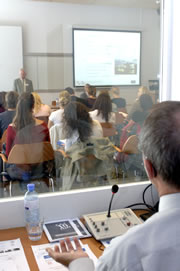Project Background and Context
In response to growing student mobility from an enlarged Europe and the developing countries, institutions within the European Union offer diverse types of orientation and integration measures, preparatory courses, and bridging programmes to facilitate access to higher education for disadvantaged and underrepresented adult learners from very diverse ethnic, cultural, and socio-economic backgrounds. However, the needs and demands of the target group are very different from those of young learners entering higher education by the traditional progression routes and having a more homogeneous background. Furthermore, the diversity of the target group also brings with it an additional intercultural dimension.
 The
CHAGAL project was born out of the realisation that education systems have
to be responsive to the diverse backgrounds and the specific needs of the
target group and to adopt effective strategies to ensure success in the students’
undertakings.
The
CHAGAL project was born out of the realisation that education systems have
to be responsive to the diverse backgrounds and the specific needs of the
target group and to adopt effective strategies to ensure success in the students’
undertakings.
CHAGAL adult learners deserve appropriate and targeted guidance and counselling
to help their socio-cultural adjustment in the host country. They need innovative
and effective teaching and learning methods to acquire the necessary skills
to cope with the specific academic requirements. Otherwise, they most likely
will not reach their full potential. Failure to succeed will have a negative
impact on the students’ experience and is a waste of institutional resources.
In the context of the economic development and the development of society
as a whole, it is a loss not only to the host countries but also to the students’
home countries. An innovative and inclusive curriculum sensitive to the students’
diversity not only promotes positive student experience and success, but also
reflects the host country’s acceptance of the benefits these students
have to offer. Embracing diversity is one way of achieving social inclusion
and moving towards the goals of the Bologna Process . Moreover, developing
curricula for this special target group will be a means of improving quality
management in the context of worldwide student mobility.
“Bologna Process” refers to the programme of the higher education ministers from 32 European countries who met in Prague on May 19, 2001, two years after the Bologna Declaration, and launched the process of creating a “European Higher Education Area” by 2010. For further information see: http://europa.eu.int/comm/education/policies/educ/bologna/